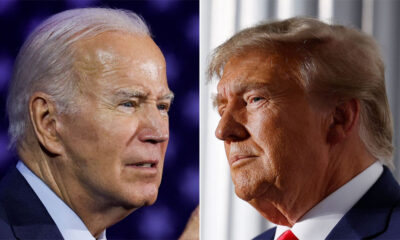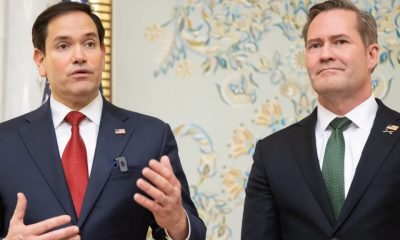News
Afghanistan: Biden defends US pullout, warns Taliban leaders

President Joe Biden says he has no regrets in withdrawing the United States troops from Afghanistan despite searing images of chaos in Kabul that exposed the limits of US power and plunged him into the worst crisis of his presidency.
He spoke Monday on the US pullout after scenes of bedlam dominated television news channels for days.
Biden blamed the Taliban’s takeover in Afghanistan on Afghan political leaders who fled the country and the unwillingness of the US-trained Afghan army to fight the militant group.
He warned Taliban leaders that they would face “devastating force” should they interfere with the US pullout.
“I’m deeply saddened by the facts we now face. But I do not regret my decision to end America’s war-fighting in Afghanistan and maintain a laser focus on our counterterrorism mission,” he said.
Biden was forced to send US troop reinforcements to Kabul to ensure a safe withdrawal of American diplomatic personnel and civilians as well as Afghan citizens who worked with the United States and could face reprisals.
Full speech of Joe Biden’s remarks on Afghanistan
Good afternoon.
I want to speak today to the unfolding situation in Afghanistan, the developments that have taken place in the last week and the steps we’re taking to address the rapidly evolving events.
My national security team and I have been closely monitoring the situation on the ground in Afghanistan and moving quickly to execute the plans we had put in place to respond to every contingency, including the rapid collapse we’re seeing now.
I’ll speak more in a moment about the specific steps we’re taking. But I want to remind everyone how we got here and what America’s interests are in Afghanistan.
We went to Afghanistan almost 20 years ago with clear goals: get those who attacked us on Sept. 11, 2001, and make sure Al Qaeda could not use Afghanistan as a base from which to attack us again. We did that. We severely degraded Al Qaeda and Afghanistan. We never gave up the hunt for Osama bin Laden and we got him.
That was a decade ago. Our mission in Afghanistan was never supposed to have been nation-building. It was never supposed to be creating a unified, centralized democracy. Our only vital national interest in Afghanistan remains today what it has always been: preventing a terrorist attack on the American homeland.
I’ve argued for many years that our mission should be narrowly focused on counterterrorism, not counterinsurgency or nation-building. That’s why I opposed the surge when it was proposed in 2009 when I was vice president. And that’s why as president I’m adamant we focus on the threats we face today, in 2021, not yesterday’s threats.
Today a terrorist threat has metastasized well beyond Afghanistan. Al Shabab in Somalia, Al Qaeda in the Arabian Peninsula, Al Nusra in Syria, ISIS attempting to create a caliphate in Syria and Iraq and establishing affiliates in multiple countries in Africa and Asia. These threats warrant our attention and our resources. We conduct effective counterterrorism missions against terrorist groups in multiple countries where we don’t have permanent military presence. If necessary, we’ll do the same in Afghanistan. We’ve developed counterterrorism over-the-horizon capability that will allow us to keep our eyes firmly fixed on the direct threats to the United States in the region, and act quickly and decisively if needed.
When I came into office, I inherited a deal that President Trump negotiated with the Taliban. Under his agreement, U.S. forces would be out of Afghanistan by May 1, 2021, just a little over three months after I took office. U.S. forces had already drawn down during the Trump administration from roughly 15,500 American forces to 2,500 troops in country. And the Taliban was at its strongest militarily since 2001.
The choice I had to make as your president was either to follow through on that agreement or be prepared to go back to fighting the Taliban in the middle of the spring fighting season. There would have been no cease-fire after May 1. There was no agreement protecting our forces after May 1. There was no status quo of stability without American casualties after May 1. There was only a cold reality of either following through on the agreement to withdraw our forces or escalating the conflict and sending thousands more American troops back into combat in Afghanistan and lurching into the third decade of conflict.
I stand squarely behind my decision. After 20 years, I’ve learned the hard way that there was never a good time to withdraw U.S. forces. That’s why we’re still there. We were clear about the risks. We planned for every contingency. But I always promised the American people that I will be straight with you.
The truth is, this did unfold more quickly than we had anticipated. So what’s happened? Afghanistan political leaders gave up and fled the country. The Afghan military collapsed, sometimes without trying to fight. If anything, the developments of the past week reinforced that ending U.S. military involvement in Afghanistan now was the right decision.
American troops cannot and should not be fighting in a war and dying in a war that Afghan forces are not willing to fight for themselves. We spent over a trillion dollars. We trained and equipped an Afghan military force of some 300,000 strong. Incredibly well equipped. A force larger in size than the militaries of many of our NATO allies. We gave them every tool they could need. We paid their salaries, provided for the maintenance of their air force, something the Taliban doesn’t have. Taliban does not have an air force. We provided close air support. We gave them every chance to determine their own future. What we could not provide them was the will to fight for that future.
There are some very brave and capable Afghan special forces units and soldiers. But if Afghanistan is unable to mount any real resistance to the Taliban now, there is no chance that one year — one more year, five more years or 20 more years — that U.S. military boots on the ground would have made any difference.
Here’s what I believe to my core: It is wrong to order American troops to step up when Afghanistan’s own armed forces would not. The political leaders of Afghanistan were unable to come together for the good of their people, unable to negotiate for the future of their country when the chips were down. They would never have done so while U.S. troops remained in Afghanistan bearing the brunt of the fighting for them. And our true strategic competitors, China and Russia, would love nothing more than the United States to continue to funnel billions of dollars in resources and attention into stabilizing Afghanistan indefinitely.
When I hosted President Ghani and Chairman Abdullah at the White House in June, and again when I spoke by phone to Ghani in July, we had very frank conversations. We talked about how Afghanistan should prepare to fight their civil wars after the U.S. military departed. To clean up the corruption in government so the government could function for the Afghan people. We talked extensively about the need for Afghan leaders to unite politically. They failed to do any of that. I also urged them to engage in diplomacy, to seek a political settlement with the Taliban. This advice was flatly refused. Mr. Ghani insisted the Afghan forces would fight, but obviously he was wrong.
So I’m left again to ask of those who argue that we should stay: How many more generations of America’s daughters and sons would you have me send to fight Afghanistan’s civil war when Afghan troops will not? How many more lives, American lives, is it worth, how many endless rows of headstones at Arlington National Cemetery? I’m clear on my answer: I will not repeat the mistakes we’ve made in the past. The mistake of staying and fighting indefinitely in a conflict that is not in the national interest of the United States, of doubling down on a civil war in a foreign country, of attempting to remake a country through the endless military deployments of U.S. forces. Those are the mistakes we cannot continue to repeat because we have significant vital interest in the world that we cannot afford to ignore.
I also want to acknowledge how painful this is to so many of us. The scenes that we’re seeing in Afghanistan, they’re gut-wrenching, particularly for our veterans, our diplomats, humanitarian workers — for anyone who has spent time on the ground working to support the Afghan people. For those who have lost loved ones in Afghanistan, and for Americans who have fought and served our country in Afghanistan, this is deeply, deeply personal. It is for me as well.
I’ve worked on these issues as long as anyone. I’ve been throughout Afghanistan during this war, while the war was going on, from Kabul to Kandahar, to the Kunar Valley. I’ve travelled there on four different occasions. I’ve met with the people. I’ve spoken with the leaders. I spent time with our troops, and I came to understand firsthand what was and was not possible in Afghanistan. So now we’re focused on what is possible.
We will continue to support the Afghan people. We will lead with our diplomacy, our international influence and our humanitarian aid. We’ll continue to push for regional diplomacy and engagement to prevent violence and instability. We’ll continue to speak out for the basic rights of the Afghan people, of women and girls, just as we speak out all over the world.
I’ve been clear, the human rights must be the centre of our foreign policy, not the periphery. But the way to do it is not through endless military deployments. It’s with our diplomacy, our economic tools and rallying the world to join us.
Let me lay out the current mission in Afghanistan: I was asked to authorize, and I did, 6,000 U.S. troops to deploy to Afghanistan for the purpose of assisting in the departure of U.S. and allied civilian personnel from Afghanistan, and to evacuate our Afghan allies and vulnerable Afghans to safety outside of Afghanistan. Our troops are working to secure the airfield and ensure continued operation on both the civilian and military flights. We’re taking over air traffic control. We have safely shut down our embassy and transferred our diplomats. Our diplomatic presence is now consolidated at the airport as well.
Over the coming days we intend to transport out thousands of American citizens who have been living and working in Afghanistan. We’ll also continue to support the safe departure of civilian personnel — the civilian personnel of our allies who are still serving in Afghanistan. Operation Allies Refuge, which I announced back in July, has already moved 2,000 Afghans who are eligible for special immigration visas and their families to the United States. In the coming days, the U.S. military will provide assistance to move more S.I.V.-eligible Afghans and their families out of Afghanistan.
We’re also expanding refugee access to cover other vulnerable Afghans who work for our embassy. U.S. nongovernmental organizations and Afghans who otherwise are a great risk in U.S. news agencies — I know there are concerns about why we did not begin evacuating Afghan civilians sooner. Part of the answer is some of the Afghans did not want to leave earlier, still hopeful for their country. And part of it because the Afghan government and its supporters discouraged us from organizing a mass exodus to avoid triggering, as they said, a crisis of confidence.
American troops are performing this mission as professionally and as effectively as they always do. But it is not without risks. As we carry out this departure, we have made it clear to the Taliban: If they attack our personnel or disrupt our operation, the U.S. presence will be swift, and the response will be swift and forceful. We will defend our people with devastating force if necessary. Our current military mission is short on time, limited in scope and focused in its objectives: Get our people and our allies as safely and quickly as possible. And once we have completed this mission, we will conclude our military withdrawal. We will end America’s longest war after 20 long years of bloodshed.
The events we’re seeing now are sadly proof that no amount of military force would ever deliver a stable, united, secure Afghanistan, as known in history as the graveyard of empires. What’s happening now could just as easily happen five years ago or 15 years in the future. We have to be honest, our mission in Afghanistan made many missteps over the past two decades.
I’m now the fourth American president to preside over war in Afghanistan. Two Democrats and two Republicans. I will not pass this responsibility on to a fifth president. I will not mislead the American people by claiming that just a little more time in Afghanistan will make all the difference. Nor will I shrink from my share of responsibility for where we are today and how we must move forward from here. I am president of the United States of America, and the buck stops with me.
I’m deeply saddened by the facts we now face. But I do not regret my decision to end America’s war-fighting in Afghanistan and maintain a laser focus on our counterterrorism mission, there and other parts of the world. Our mission to degrade the terrorist threat of Al Qaeda in Afghanistan and kill Osama bin Laden was a success. Our decades-long effort to overcome centuries of history and permanently change and remake Afghanistan was not, and I wrote and believed it never could be.
I cannot and will not ask our troops to fight on endlessly in another country’s civil war, taking casualties, suffering life-shattering injuries, leaving families broken by grief and loss. This is not in our national security interest. It is not what the American people want. It is not what our troops who have sacrificed so much over the past two decades deserve. I made a commitment to the American people when I ran for president that I would bring America’s military involvement in Afghanistan to an end. While it’s been hard and messy and, yes, far from perfect, I’ve honoured that commitment.
More importantly, I made a commitment to the brave men and women who serve this nation that I wasn’t going to ask them to continue to risk their lives in a military action that should’ve ended long ago. Our leader did that in Vietnam when I got here as a young man. I will not do it in Afghanistan.
I know my decision will be criticized. But I would rather take all that criticism than pass this decision on to another president of the United States, yet another one, a fifth one. Because it’s the right one, it’s the right decision for our people; the right one for our brave service members who risked their lives serving our nation. And it’s the right one for America.
Thank you. May God protect our troops, our diplomats and all brave Americans serving in harm’s way.
News
Rivers: Tinubu acted to save state, economy, says Karimi
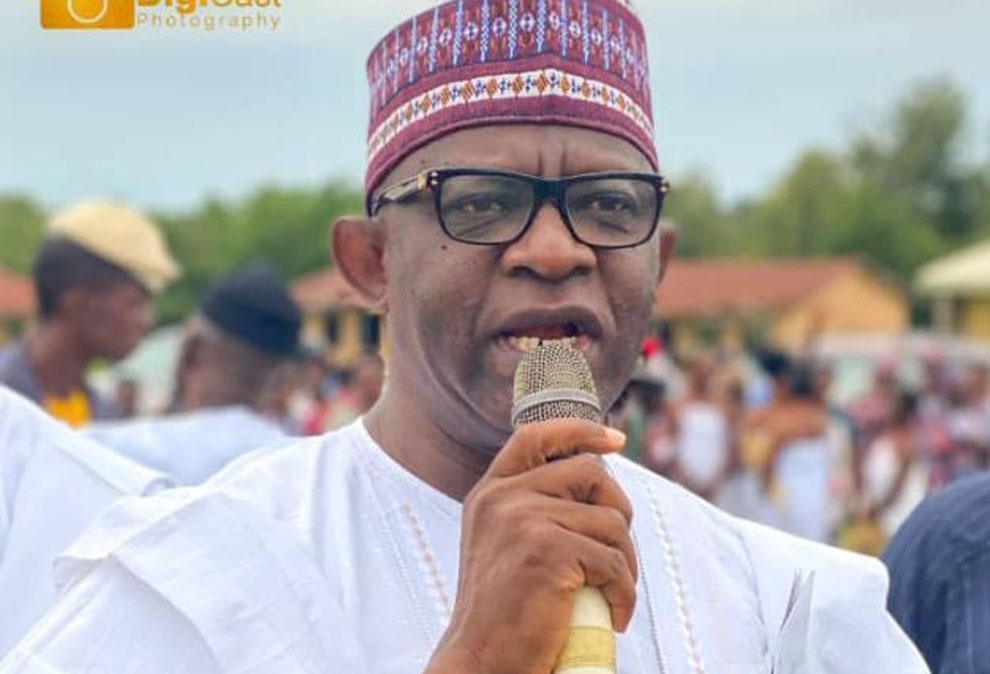
Rivers: Tinubu acted to save state, economy, says Karimi
Chairman of the Senate Services Sunday Karimi has hailed President Bola Tinubu for the decision to declare a state of emergency in Rivers State.
He told reporters on Friday in Abuja that the President acted in the best interest of the State and Nigeria, having taken his decision in compliance with the Constitution.
“No President or government worth a name, will fold its arms and watch a political situation deteriorate to what we saw unfolding in Rivers State.
“We saw that bombing of pipelines had begun, and the security situation was getting worse with the tension everywhere”, Karimi stated.
Karimi, who represents Kogi-West on the ticket of the All Progressives Congress (APC), recalled the “fatherly role” Tinubu had played in the crisis since 2023 in a bid to get the Minister of the Federal Capital Territory (FCT), Nyesom Wike, and suspended Governor Siminalayi Fubara to reach an understanding, to no avail.
He explained: “We were all here in 2023 when Mr President called that truce meeting at the Aso Rock Villa. There was the eight-point agenda for settlement reached between the factions.
“When Nigerians expected that progress should be made to achieve peace, things started deteriorating considerably to a point where the governor demolished the House of Assembly building and administered the state with only three legislators.”
READ ALSO:
- Oluwo accuses Ooni of plotting to dethrone him
- Natasha: Court blocks recall attempt, stops INEC
- US ends legal status for 500,000 immigrants
Karimi observed that with the recent judgment of the Supreme Court, which gave the upper hand to the 27 lawmakers loyal to the camp of the FCT Minister, matters merely got worse in the State as the lawmakers were set to impeach the Governor.
“What did you expect would be the implications? There would have been more destruction, killings and economic losses for the country.
“With the bombings that had already started, it was a matter of time before the whole state would be engulfed in flames. No responsible President would sit, arms folded, and allow that to happen “ he added.
The senator further argued that it took “painstaking efforts” by the administration to raise daily crude oil production to around 1,800 barrels, noting that Nigeria’s economy was already “witnessing a rebound under the renewed hope projects of the government.”
“Allowing the situation in Rivers to get worse before he would act, wouldn’t have helped the state or Nigeria as a country in any way.
“Mr. President intervened at the right time, and his actions are covered by law,” he said.
Karimi also spoke on the emergency declaration in Borno, Yobe, Adamawa and a couple of other states by former President Goodluck Jonathan without removing the Governors from office or suspending the state assemblies.
According to him, the case with those States was not generated by political crises but rather security concerns.
“So, I will advise those comparing the two scenarios to remember that one was purely about security threats resulting from the insurgency caused by Boko Haram, while that of Rivers is clearly political.
“It was the proper thing to do to suspend the political actors in the two factions to allow for tensions to diffuse. Nigerians should appreciate the President for the action he has taken so far,” he stated.
Sen. Karimi also noted that there was no cause for alarm as the National Assembly had indicated that the emergency rule could be reviewed as soon as there were signs that things could quickly normalise in Rivers State.
Rivers: Tinubu acted to save state, economy, says Karimi
News
Just in: Tinubu swears in Rivers Sole Administrator Ibas
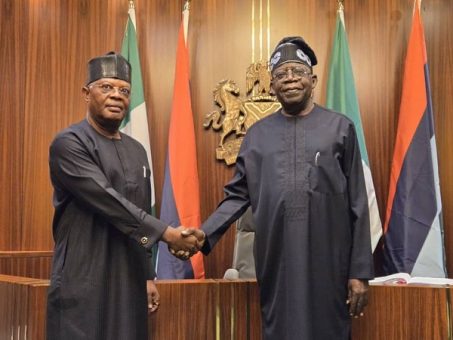
Just in: Tinubu swears in Rivers Sole Administrator Ibok-ete Ibas
President Bola Tinubu has sworn in Vice Vice Admiral Ibok-ete Ibas (Retd.) as the Sole Administrator of Rivers State.
The administrator was sworn in on Wednesday after a short meeting with the President.
Tinubu announced the appointment of the retired naval chief at a nationwide broadcast on Tuesday, when he declared a state of emergency in Rivers State and suspended Governor Siminalayi Fubara, Deputy Governor, Ngozi Odu, and the state House of Assembly members.
The President said his decision was based on Section 305 of the 1999 Constitution, saying he could not continue to watch the political situation in Rivers escalate without taking concrete action.
The suspension of Fubara and other elected representatives has been rejected and condemned by many eminent Nigerians, legal luminaries, groups such as Atiku Abubakar, Peter Obi, Femi Falana, the Labour Party (LP), the Peoples Democratic Party (PDP) and the Nigerian Bar Association.
However, the emergency rule has been praised by the pro-Nyesom Wike Assembly led by Martins Amaewhule, accusing Fubara of contravening the Supreme Court ruling on the political situation in the state.
Ibas was the Chief of Naval Staff from 2015 to 2021.
He is from Cross River State where he had his early education.
The new sole administrator went to the Nigerian Defence Academy in 1979 from where he proceeded to have a successful career in the Navy, rising through the ranks to the very top.
He is a member of the Nigerian Institute of International Affairs (NIIA) and the Nigerian Institute of Management.
President Muhammadu Buhari who appointed him as Chief of Naval Staff conferred him with the National Honour of Commander of the Federal Republic (CFR) in 2022.
News
Breaking: Tinubu declares state of emergency in Rivers State

Breaking: Tinubu declares state of emergency in Rivers State
President Bola Tinubu on Tuesday night declared a state of emergency in Rivers State following the protracted political crisis in the state.
Tinubu made the declaration during a nationwide broadcast, saying it is for six months.
He announced the suspension of the Executive Governor, Siminalayi Fubara, his deputy and all the members of the House of Assembly for six months.
He immediately named an administrator, Vice Admiral Ibok-Ete Ibas (Retd), to take charge of the affairs of the state for the six-month period.
Section 305 of the 1999 Constitution interprets a state of emergency as a situation of national danger or disaster in which a government suspends normal constitutional procedures to regain control.
A state of emergency allows the President to immediately make any desired regulations to secure public order and safety. (Channels TV)
-

 International2 days ago
International2 days agoUK announces new passport application fees starting April 2025
-

 metro23 hours ago
metro23 hours ago‘We’re not hiring,’ NNPC denies viral recruitment adverts
-
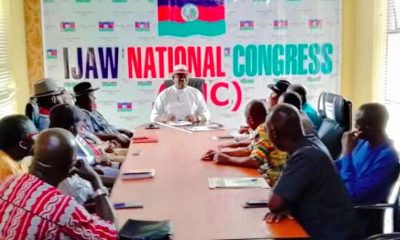
 metro1 day ago
metro1 day agoMore trouble brews in Rivers as Ijaw congress considers self-determination option
-

 metro2 days ago
metro2 days agoCourt lifts order stopping Senate probe on Natasha Akpoti
-

 metro2 days ago
metro2 days agoMohbad’s brother, Adura, arrested by police in Lagos
-

 metro3 days ago
metro3 days agoTanker explodes on Abuja bridge, many feared dead, 30 vehicles burnt
-
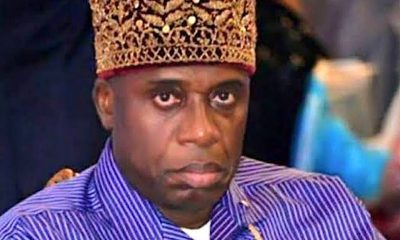
 Politics3 days ago
Politics3 days agoEmergency rule cannot stand in Rivers, says Amaechi, mobilises against Tinubu
-

 metro1 day ago
metro1 day agoAkpabio told me I’d make good movements with my waist – Natasha







